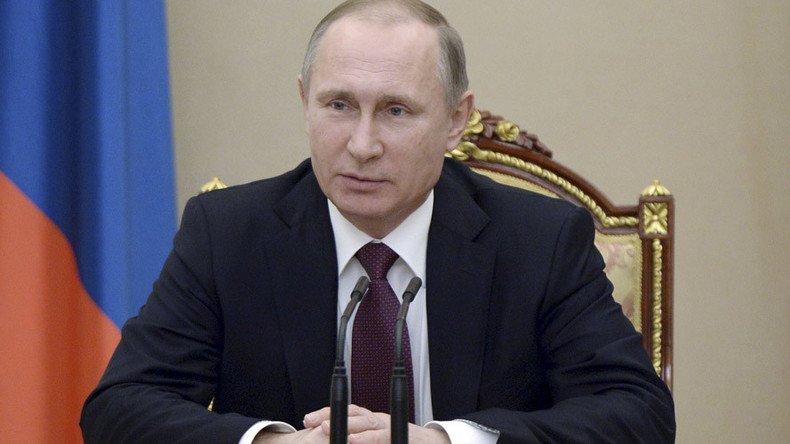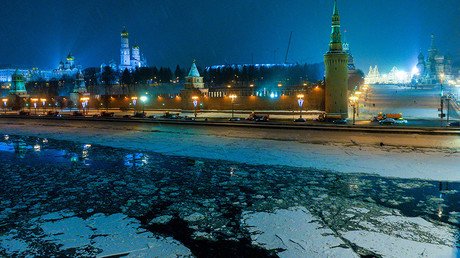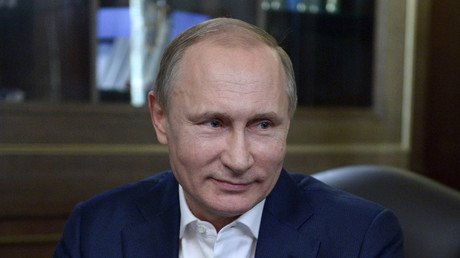Putin becomes target of bizarre personal attacks as West's regime-change policy fizzles

Although Vladimir Putin rarely gets an honest and objective handling from the Western political and media establishment, the level and type of attacks against the Russian leader of late can only be described as dangerous, delusional and very deliberate.
The West has kicked off 2016 with a level of vilification against Putin that is so detached from reality that it actually serves to highlight the misdeeds of the accusers, desperate as they are to keep their regime-change operations going strong, together with a wobbly anti-Russia alliance, complete with a NATO build-up on Russia's border.
‘Probable involvement’ of Putin, Russian officials in #Litvinenko death - UK inquiry https://t.co/aoIiAL2nu3pic.twitter.com/muQ1wPqZWy
— RT (@RT_com) January 21, 2016The first personal attack of the year against Putin came courtesy of a British public inquiry, which pronounced from the media mountaintops that Putin "probably" ordered the assassination of former KGB officer Alexander Litvinenko in London in 2006.
The indecisive nature of the so-called 'verdict,' which essentially threw legal procedure out the window, not to mention the barest scrap of evidence, would be easy to ignore if the announcement was not so conspicuously politically motivated at a time of high dungeon on the global stage.
What could possibly go wrong with a case involving the murder in London of a former KGB agent, who had close connections to the late exiled oligarch Boris Berezovsky, at a time when tensions between Russia and the West are at an all-time high. In a nutshell, pretty much everything.
Alexander Mercouris, a practicing lawyer for 12 years at the Royal Courts of Justice, described the failings of the public inquiry: "The Public Inquiry that has now delivered its verdict in the Litvinenko case has thrown all this out of the window. There was no jury. Part of the evidence was secret and the defendants and their lawyers were denied sight of it. Some of the witnesses gave their evidence to the Judge in secret and their identities were not disclosed to the defendants."
Clearly, when it comes to anything involving Russia in general, or Vladimir Putin in particular, any notion of fair play is cast aside in order to portray the Russian leader as some sort of bogeyman. As journalist John Wight commented in a recent opinion piece for RT, "If his depiction in the West is to be believed, Putin makes Don Corleone look like a petty bag snatcher by comparison, with Russia under his watch guilty of everything up to and including climate change, you could be forgiven for thinking."
What next? Putin declared 'corrupt' by US Treasury
No sooner had the world digested the unsavory news of Britain's laughable verdict against Putin, along came another head scratcher, this one accusing the Russian leader of being 'corrupt.' The allegations were put forward by one Adam Szubin, the US Treasury's Acting Under-Secretary for terrorism and financial crimes in an interview with none other than the BBC.
"He supposedly draws a state salary of something like $110,000 a year. That is not an accurate statement of the man's wealth, and he has long time training and practices in terms of how to mask his actual wealth," Szubin squealed to BBC's Richard Bilton. When asked by Bilton "If Putin is corrupt," Szubin responded: "In our view, yes."
"Whether that's Russia's energy wealth, whether it's other state contracts, he directs those to whom he believes will serve him and excludes those who don't. To me, that is a picture of corruption," Szubin said. And much like the Litvinenko public inquiry that delivered very ambiguous and suspiciously timed 'verdict' against Putin, Szubin failed to support his outrageous statements with any evidence whatsoever.
President Putin's spokesman Dmitry Peskov told the BBC that "none of these questions or issues needs to be answered, as they are pure fiction." Such unsubstantiated charges of corruption, now being foisted upon the Russian leader by a US government agency, represents the next level of a longstanding effort to demonize the Russian government and president for nothing less than raw geopolitical gain.
In an interview with RT in May 2015, the head of the presidential administration, Sergey Ivanov, referred to such tactics as a "sort of blacklisting process... mostly in the American and British papers."
"I often read articles saying that President Putin and his 'cronies' - the language is not mine, but the papers' - are fully corrupted, connected with criminality, they have huge profits which they successfully hide, and things like that," Ivanov said at the time. Ivanov dismissed the reports as "rubbish" that "can't be respected by those who are serious enough to analyze the information."
As an American, I am more than dismayed to see that the US Treasury - which surrendered its constitutional duties to the Federal reserve many decades ago - is demonstrating an eagerness to stain the reputation of a foreign world leader, yet turns a blind eye to the well-known crimes committed by the American financial elite, activities that led to the 2008 Great Recession, the worst economic downturn since the Great Depression of 1929.
Considering how things have been going for the United States and its global pursuits of late - most of which subscribe to vicious regime-change operations, as already witnessed in Afghanistan, Iraq, and Libya, with efforts hotly underway in Syria - perhaps these personal vendettas of sorts are least surprising of all for Russian President Vladimir Putin. After all, his unmatched leadership is almost single-handedly responsible for thwarting US imperial ambitions in a number of hotspots of late, most notably in Ukraine and Syria.
Not only has Putin demonstrated tremendous finesse in handling the Syrian crisis (too easily has it been forgotten that he convinced Assad to surrender his chemical weapons, thus temporarily thwarting Washington's regime-change plans), he has opened up a fierce military campaign against Islamic State, the most loathsome terrorist organization to bestride planet Earth since the Mongols and Huns were in business.
Yet this significant and exceedingly risky act has not won Putin any accolades in Western circles - and despite the fact that Russia's aerial offensive has dealt ISIS a severe setback. Indeed, the 'gratitude' for Putin's actions was nowhere more felt than when Turkey - believed by many to be profiting handsomely from Islamic State's oil venture in Syria - shot down a Russian fighter jet near its border on November 24.
With these factors in mind, it should come as no surprise that Vladimir Putin has become the target of a fierce Western propaganda campaign that is aimed at destroying his reputation both at home and abroad. But given Putin's outstanding accomplishments to date, the ill-conceived strategy will ultimately fall flat, with the majority of people around the world comprehending where the real root of evil and corruption really exists. Hint: It's nowhere near the Kremlin.
This article first appeared in slightly altered form at Rethinking Russia
The statements, views and opinions expressed in this column are solely those of the author and do not necessarily represent those of RT.















